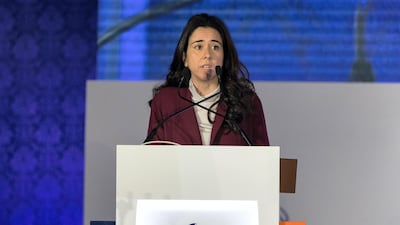Gender equality in the workplace is necessary for healthy, successful economies – but the gaps between working men and women is widening around the world.
Differences in workforce participation, wages earned and leadership positions are increasing, the UAE’s permanent representative to the UN, Lana Nusseibeh, told a conference in Abu Dhabi yesterday.
“The 2017 Global Gender Gap report reveals that for the first time since the World Economic Forum records began in 2006, the global gender gap is in fact widening,” Ms Nusseibeh said.
“Of 144 countries, the majority have closed 96 per cent of the gap in health outcomes between men and women – unchanged since last year – and then more than 95 per cent of the gap in educational attainment, which is a slight decrease compared to last year.
“However, the gaps between women and men on economic participation and political empowerment remains wide.
“Only 58 per cent of the economic participation gap has been closed, the lowest value measured by the index since 2008, and only 23 per cent of the political gap has been closed, unchanged since last year.
“Women across the world are still on average earning less than men by a large amount.”
Last year’s WEF report said that given current progress it would take 170 years to close the economic gender gap. This year that estimate was 217 years – a big step backwards.
“The UAE has long acknowledged the importance of investing in women to maximise their full potential for our country’s development,” Ms Nusseibeh said.
_____________
Read more
UAE seeks to improve gender equality
UAE seeks to revitalise the UN, ambassador says
_____________
“Research has found that the global GDP has the potential to rise by $12 trillion by 2025 by narrowing the global gender gap. In the Middle East and North Africa, this would mean an additional 50 per cent increase in our GDP by 2025.”
The ambassador was speaking at the Gender Dimensions of International Peace and Security: Keys to Prosperity and Peace conference.
Ms Nusseibeh said that women were consistently excluded from taking part in conflict resolution, despite bearing the biggest burden in war and the fact that their participation is critical to ensure peace.
“Fifty per cent of peace processes fail within five years, but when women participate there is a 35 per cent chance that peace will last 15 years or longer,” she said. “It’s because women go through this world with a unique set of experiences proving vital at the negotiating table.
“When men are alone at the table, the conversation tends to focus on issues of power and state, but women raise key issues of economy and social necessity, education, health, infrastructure and access to justice.
“These are often misconstrued as women’s issues but the lack of these can be a key driver towards fragility.”
Ms Nusseibeh said women were more likely to raise issues that directly affected all societies, on which a lasting peace could be built.
“This is important for diversity of thought,” she said. “When you bring together a group of people from a range of backgrounds, they consider a wide range of issues and generate [diverse] solutions.
“Gender equality and women’s empowerment are not just worthy goals to pursue but crucial to establish prosperous and stable societies.”
Sheikh Nahyan bin Mubarak, the Minister of Tolerance, said the paramount role of women in war zones and their participation in peace processes have become a critical element in solving crises and reducing violence globally.
“Women and men have equally important roles to play in society,” Sheikh Nahyan said. “Women have a critical role to play in resolving disputes and ensuring the success of efforts aimed at the peaceful settlement of resolutions that have beneficial outcomes for the world.
“Women have great capabilities and massive innovative potential that can represent a key element and critical factor in ensuring the safety and security of community.”
The number of women and children dying in conflicts and being driven into refugee camps is increasing drastically.
“It has become a phenomenon that we are living and requires us to urge the world to handle because they affect the world’s development,” said Reem Al Hashimy, Minister of State for International Co-operation.
“Poverty and economic decline are not only results of this but keeping women away and not allowing them to participate in decision-making.
“All this requires us to work together to face the traditional concepts that keep women away from helping communities so we have to face the stereotypes of women in conflict zones and enhance their role in solving crises.”

